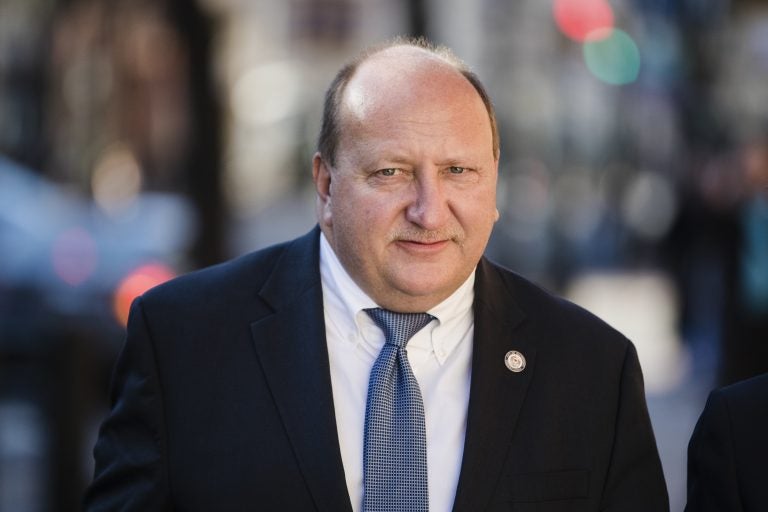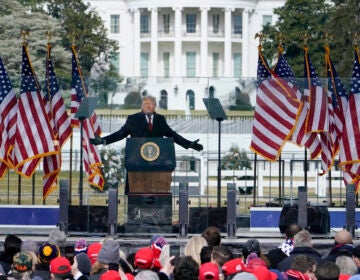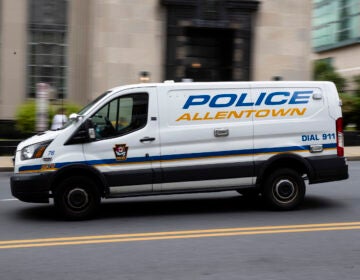Federal judge hints he won’t toss charges against Allentown mayor

Ex-Allentown mayor Ed Pawlowski, who was found guilty of corruption charges, had denied accusations that he accepted more than $150,000 in campaign contributions in exchange for city contracts. (AP Photo/Matt Rourke)
Lawyers for indicted Allentown Mayor Ed Pawlowski asked a federal judge in Philadelphia on Tuesday to dismiss the more than 50-count corruption case prosecutors are pursuing against the four-term mayor and two associates, arguing that the charges — including bribery, fraud and extortion — have been ginned up by the government.
“You look at the evidence, and you read the indictment, and you asked yourself, ‘Am I missing something?’” said defense lawyer Jack McMahon, who is representing Pawlowski. “It’s like you read the indictment, and you’re waiting for the other shoe to drop, and it never happens.”
Federal prosecutors this summer unsealed a wide-ranging indictment against Pawlowski, alleging that he steered city contracts to companies that were plying him with gifts and campaign contributions.
McMahon spent most of the hearing accusing the government of providing the grand jury with “a completely false narrative” that omitted evidence that would have shown that Pawlowski did nothing wrong.
Therefore, McMahon argued, the grand jury process was unfair to Pawlowski.
“There was evidence that negated his criminal intent,” McMahon said. “It was reckless and misleading to not present this to the grand jury. If there is a willful misleading of the grand jury, the indictment can be dismissed.”
Among that evidence, McMahon said, was a conversation caught on tape by the FBI of Pawlowski adviser Mike Fleck, who has cooperated with the government and pleaded guilty in the case.
“ ‘Ed has never done anything wrong. I am not going to go in there set him up to nail someone,’ ” McMahon said, citing a recording transcript for Fleck. “ ‘The government is making up crimes.’ ”
But Assistant U.S. Attorney Anthony Wzorek said a grand jury heard the evidence the government presented to them, and all agreed there was enough to show probable cause that Pawlowski and his co-defendants committed the alleged crimes.
“You don’t reweigh the evidence, or reweigh the charges. That’s not the rule of the court at this stage,” Wzorek said.
Although U.S. District Judge Juan Sanchez did not make a ruling from the bench, his comments throughout the hearing suggested that he was sympathetic with the government’s positions.
“I know you want to prosecute the prosecutors for how they handed this case,” the judge said to McMahon. “But you’re asking me to do something that is counter to the whole grand jury system.”
The trial of Pawlowski and his two associates is scheduled to begin Jan. 16 in Allentown.
Pawlowski’s legal team: No explicit quid pro quo
Prosecutors have said that Pawlowski essentially erected a “For Sale” sign in front of City Hall, sending lucrative city work to the highest bidders.
People who gave Pawlowski donations ended up landing contracts for city pool renovations, tax collection and computer security improvements.
To cover up his crimes, Pawlowski allegedly deleted emails with donors and told his campaign operatives to do the same. He also “swept” his offices for recording devices, since he thought he was being bugged by investigators, according to FBI Special Agent Michael Harpster.
Yet McMahon told the judge that the arrangement depicted in the charging documents were cherry-picked to support the conclusion of prosecutors.
“The government has taken the chips and finally honed the chips and finally placed the chips where they want them to be fit this false narrative,” McMahon said.
Sanchez replied: “It seems to me you are challenging the sufficiency of the evidence, which you can do at the trial.”
Attorneys for Pawlowski and co-defendants Scott Allinson and Jim Hickey also raised the U.S. Supreme Court decision that reversed the conviction of former Virginia Gov. Bob McDonnell.
That 2016 case, which narrowed the definition of an “official act,” made it harder for prosecutors to prove quid pro quo corruption cases against politicians where there is no explicit link between a donation and a political favor.
Previously, prosecutors could win bribery cases just by showing that an elected official received perks or campaign donations in exchange for the giver basically being in the officeholder’s back pocket, awaiting something in return, rather than a clearcut “this-for-that” arrangement.
Knowing this, McMahon seized on the distinction.
“There is no evidence at all to suggest there was an explicit quid pro quo,” he said. “There is no evidence that he had any role in an official action to create the awarding of contracts.”
“There isn’t a scintilla of evidence of this,” Allinson lawyer Megan Scheib later told the court. “None of the allegations fall within that zone of conduct in the criminal sphere.”
Tuesday’s hearing was focused on a motion to dismiss, which usually deals with procedural issues such as whether the court is the right venue for the case or whether the charges were filed properly.
Prosecutor Wzorek said defense lawyers have a right to make such objections and ask the court to throw out the case after the government shows the jury all of its evidence.
“What we have here basically is an argument over the filings,” Wzorek said. “We shouldn’t even be here, judge.”
WHYY is your source for fact-based, in-depth journalism and information. As a nonprofit organization, we rely on financial support from readers like you. Please give today.



